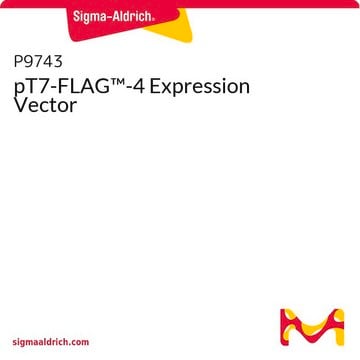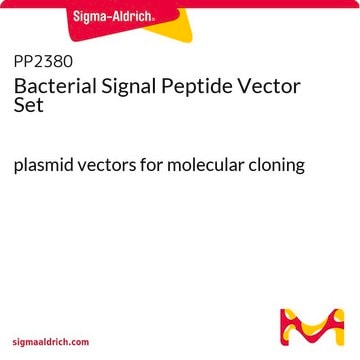T6824
pPolh-FLAG-1 Transfer Vector
Sinónimos:
ddddk tag, dykddddk tag
Iniciar sesiónpara Ver la Fijación de precios por contrato y de la organización
About This Item
UNSPSC Code:
41106621
NACRES:
NA.32
Productos recomendados
Categorías relacionadas
General description
The pPolh-FLAG-1 vector contains the strong viral polyhedrin (polh) promoter for high-level expression of target genes during the very late phase of infection. The vector also contains a high copy bacterial origin of replication and an ampicillin resistance gene (ampr) for easy propagation in Escherichia coli host cells. Following co-transfection with linear baculovirus DNA into insect cells, allelic replacement between homologous viral sequences (AcNPV ORF 603 and ORF 1629) in the vector and the baculovirus DNA transfers the FLAG-target gene fusion sequence into the viral genome.
Application
pPolh-FLAG-1 is a 5575 bp baculovirus transfer vector used for producing FLAGÒ fusion proteins in insect cells. The vector is designed to be compatible with most baculoviral DNA systems that require the essential gene ORF1629 for complementation of lethal deletions and the recovery of viable recombinant virus. It is also a transfer vector for generation of recombinant Baculovirus and expression of N-terminal FLAG® fusions in insect cells.
Legal Information
FLAG is a registered trademark of Merck KGaA, Darmstadt, Germany
Storage Class
12 - Non Combustible Liquids
wgk_germany
WGK 1
flash_point_f
Not applicable
flash_point_c
Not applicable
ppe
Eyeshields, Gloves, multi-purpose combination respirator cartridge (US)
Certificados de análisis (COA)
Busque Certificados de análisis (COA) introduciendo el número de lote del producto. Los números de lote se encuentran en la etiqueta del producto después de las palabras «Lot» o «Batch»
¿Ya tiene este producto?
Encuentre la documentación para los productos que ha comprado recientemente en la Biblioteca de documentos.
Baculovirus Expression Vectors
O'Reilly, D. R., et al.
Baculovirus Expression Vectors: A Laboratory Manual (1994)
Nuestro equipo de científicos tiene experiencia en todas las áreas de investigación: Ciencias de la vida, Ciencia de los materiales, Síntesis química, Cromatografía, Analítica y muchas otras.
Póngase en contacto con el Servicio técnico







